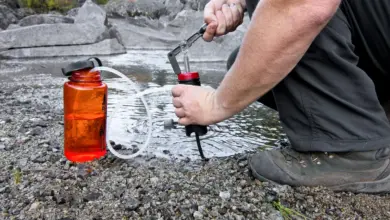Encountering a bear can be dangerous, and it’s best to be prepared when going to bear country. But will a whistle scare a bear? Or do you need something else? Let’s find out below.
If you reside in bear country, bear interactions are likely to happen regularly. It’s also possible that you enjoy camping or hiking in an area noted for its abundance of bears. If you’re heading into a region where bears may be present, you may have considered bringing a whistle with you.
Unfortunately, no matter how loud the whistle sounds, the bear will remain unfazed. Bears are not deterred by loud noise, according to research. Instead, bring a can of bear spray with you when exploring.
Even though bears aren’t afraid of whistles or loud noises, it doesn’t imply that you shouldn’t bring one with you. If you are in a bear country and need to call for aid in an emergency, a whistle can be extremely handy. While camping, a whistle may be used to alert others in the area that you’re in trouble and need assistance.
The best way to experience bear country securely is to learn how to prevent a confrontation with a bear. You need to be familiar with bear behavior if you encounter a bear. The way we react to a bear varies depending on the circumstances of the encounter. Folks who reside or travel in bear country should follow these safety tips-
Be Familiar With the Bear Habitat in Your Area
Keep an eye out for bear-friendly areas. To forage, relax, and sleep, bears seek dense undergrowth and strong tree stands. Keep an eye out for features like thick shrubs, gullies, and boulder fields, which may readily conceal a bear.
Be on the lookout for bears in their eating or resting areas. Bears are more likely to ignore you if you approach in the late summer or autumn when they are foraging.
Large patches of blooming plants, or plants with fruit like berries, should be on your radar. Be extremely cautious when near water bodies since bears may be using them for food or water.
Avoiding An Encounter: The Best Approach
Bears are especially prone to stress that may be caused by human contact because of their size. Preventing contact with these creatures may help safeguard them too.
- Make a commotion! Make it known to bears that you are present. Do not be afraid to shout or clap, sing or chat loudly, particularly in places with limited visibility and nearby streams, thick foliage, and berry patches. Bear bells aren’t sufficient on their own.
- Be on the lookout for any indication that a bear has recently been in the area. Some of these indications may include: tracks, discarded feces, gnawed wood, and pebbles that have been disturbed. If the warning indicators are still visible, you should evacuate the area as soon as possible.
- Large groups of people have a lower chance of having substantial contact with bears. Traveling in a bunch of three or more is a good idea. Children should never be left alone to wander in bear country.
- Instantly leave the location if you stumble across a huge dead animal and notify park personnel or staff nearby.
Keep Bear Spray on You at All Times
Red pepper components in bear spray have been shown to irritate bears’ eyesight and respiratory system. It’s meant to stave off an assault from a bear, but it may also compromise your respiration and vision if the wind blows it in your face. Bear spray works most efficiently within a range of 12 to 30 ft.
The best way to carry bear spray is in a waist belt on your body, not in a backpack (or even in an exterior mesh pocket). To a high degree of success, bear spray serves as a reliable deterrent.
Learn how to use it quickly because you would only have a few seconds to react. In most cases, the safety pin must be flipped off before the nozzle may be compressed. Drawing it out of the belt is something you should get used to before going on a trip to bear territory.
Watch out for sows (adult mother bears) with cubs
Depart from the region immediately if you locate a cub or a couple of cubs. The sow may be nearby, and they will be prepared to defend their cubs even though you do not see her as a threat. Approaching the Cubs is a complete no-no.
Do not approach the bears, but you can observe the sow as you carefully and quietly walk away from them. If the sow turns hostile, be prepared to protect yourself.
Black Bears vs. Grizzlies: What To Do if You Encounter a Bear
Most bears will try to escape as soon as they detect a human scent, sound, or sight. Some bears, on the other hand, may be unpredictable and lethal.
When confronted with a bear, your reaction should vary based on what kind of bear you have encountered. Both black bears and grizzlies may have varying shades of brown, making it difficult to discern the difference between the two.
There is a good probability that you may spot a black bear at a certain point in your travels as they are very common. No shoulder hump, longer ears, and a more angular facial profile distinguish black bears.
Although common in Russia and western Canada, Grizzly Bears are found only in a few locations across the lower 48 states.
These locations include predominantly Wyoming, Montana, and Idaho, with the possibility of a grizzly bear population in the North Cascades of Washington. If you want to identify a grizzly bear, check for its typical concave facial profile, as well as its noticeable shoulder hump and tiny rounded ears.
A Black Bear Encounter: What to Do
- Extend your arms to seem bigger and yell loudly; banging pots together or throwing things will frighten away a bear.
- To defend yourself, get yourself a solid stick.
- Keep food in bear canisters or metal lockers, or take it with you when you leave camp, even if it’s still in a cooking pot. Remember to keep your food out of reach of bears.
- Ditch the foodstuff if the bear continues coming near you and appears to be more intrigued by your meal than you.
- Even if a black bear approaches and appears harmless, continue to frighten it away and retreat.
In the event of an attack by a black bear:
- Do not pretend to be dead.
- Strike back with all your might. Attack its eyes and nose with sticks, pebbles, and fists. Remember: it regards you as prey.
A Grizzly Bear Encounter: What to Do
- Grizzly bears are examining you if they rise and glance at you. You don’t want to look like a danger. Avoid making eye contact and step back slowly.
- If a grizzly makes a bluffing charge, its ears would be up, and it may puff and bound in your direction. This is distinct from an assault. Stay calm, maintain your ground, and communicate your friendliness to the bear. Never turn and flee from a bear! After making a bluff attack, the bear may turn and withdraw.
In the event of an attack by a Grizzly bear:
- You know you’re dealing with an aggressive bear when its ears are flattened back, and its head is bent low. When the bear is 30 feet away, you should be prepared to use your bear spray to defend yourself. Keep calm and refrain from spraying too soon. Aim low to avoid hitting the bear above the head.
- Act dead if you do not have any spray, or it doesn’t function.
- Lie on your front with your backpack between you and the bear, and attempt to maintain your arms and legs spread wide enough to prevent you from being turned over by the bear.
- Roll yourself back to your front if the bear flips you.
Wrap Up
In the case of a bear assault, it is extremely difficult to foresee the best course of action to take. This is why it is so critical to devote time and effort to prevent a confrontation in the first place.
In this article, we have tried to give you all the information you need to avoid an encounter with a bear. We have also given tips on what you should do if you do happen to meet a bear, and what to do if one attacks you.
Please let us know if there’s anything you think we’ve missed or if you have any suggestions for how we can improve this guide. Please share it with others and mention us on your social networking sites if you appreciate the information.







